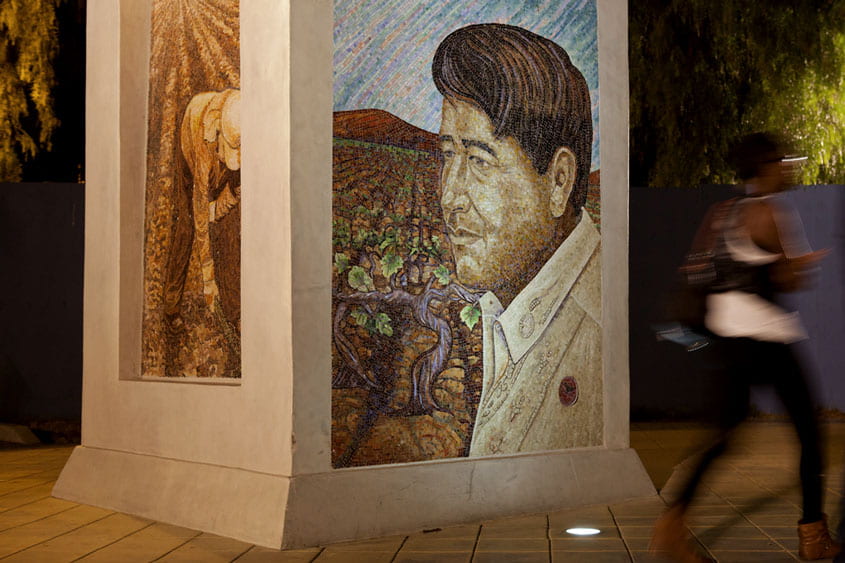A bill that moved forward in the California legislature on June 18 would require all CSU students in the class of 2025 and those beyond to complete a three-unit course in ethnic studies. If signed into law, the graduation requirement would begin in fall 2021.
College of Social Sciences Dean Walt Jacobs said that SJSU’s readiness to respond to an incoming mandate along these lines stems from the years of preparation. Several steps have already been taken to strengthen ethnic studies. One is the College of Social Sciences’ Ethnic Studies Collaborative, established in 2018.
“A collaborative is a more informal way of getting people together,” Jacobs said.
Yvonne Kwan, an assistant professor of Asian American studies, who joined the program in 2017, is director of the collaborative.
“The collaborative was a way for us to bring together the various ethnic studies programs and departments that we already have,” Kwan said. Chicana and Chicano studies and African American studies are departments, whereas Asian American studies and Native American studies programs are smaller. One thing the collaborative helps do, Kwan said, is to make them more equal and balanced. “The collaborative is a way in which we can come together to have these difficult conversations.”
Kwan said that an ethnic studies graduation requirement would help students understand what is going on in our world. “It’s important to know because K-12 education tends to have a very Eurocentric basis.” She distinguished her field from the fields of history and purely studying a culture. “It’s about a critical interdisciplinary way we understand racial and ethnic relations and how it shapes power dynamics in the United States.”
New Faculty Hires and a New Minor
Another weighty step taken, Jacobs said, is new hiring in all four of these fields.
“Three new faculty members in African American studies are starting this year, including a new department chair,” Jacobs said. “We’ve also had two recent hires in Chicana and Chicano studies, and a new faculty member in sociology who also does Native American studies is coming in this year. We also have two recent hires in Asian American studies, including Yvonne Kwan, who is doing a fabulous job leading the Ethnic Studies Collaborative. She followed inaugural director Magdalena Barrera, who will soon step down as chair of Chicana and Chicano studies to become SJSU’s vice provost for faculty success.”
In the fall, SJSU will offer a minor in comparative U.S. race and ethnic relations for undergraduates who want to pursue this topic alongside another course of study.
Kwan explained that some students already enroll in ethnic studies classes to fulfill a general education requirement. Two of her Asian American studies classes, for example, are heavily populated by students not focused intensively on ethnic studies.
Concerns that adding a three-unit ethnic studies graduation requirement might slow progress to graduation were unfounded, Kwan said. “We’re often worried about how AB 1460 could delay students’ time to graduation. But if students take an ethnic studies class, it’s not going to, because many of our existing courses already fulfill several GE requirements.”
She said students complete her classes with new skills and tools for looking at history, culture, comparative thinking and especially how power structures work.
She described one student who, at the beginning of the semester, told her that ethnic studies fosters divisive thinking. “But by the end of the semester—and especially with COVID and the proliferation of anti-Asian racism,” she said, the student’s understanding and analysis changed. The student said, “Many minority communities still do not have full human rights. People fought for ethnic studies courses because ethnic minorities have been politically oppressed for a really long time, and no one wanted to talk about it.”
Kwan added that sometimes ethnic studies classes serve other purposes—like engaging students and building skills that help them in whatever other course of study they are pursuing. “The research shows that it doesn’t matter what race you are. It benefits students academically and socially,” she said. “Also for students of color in particular, ethnic studies increases retention and graduation rates.”
About AB 1460
According to the language of the bill, AB 1460, “It is the intent of the Legislature that students of the California State University acquire the knowledge and skills that will help them comprehend the diversity and social justice history of the United States and of the society in which they live to enable them to contribute to that society as responsible and constructive citizens.”
Kwan described how the bill had moved forward in 2020. “As a collaborative, we’d been having this conversation [about the issues in the bill] for a very long time. The recent reinvigoration of the Black Lives Matter movement, spurred on by continued proliferation of police brutality and the murder of Breonna Taylor, George Floyd, Ahmaud Arbery, Tony McDade, Dion Johnson—and the list goes on—made it ever so clear that this is what we need at this moment. Because AB 1460 passed with a great majority, 30 to 5, it’s clear that ethnic studies is important.”
Although no ethnic studies graduation requirement is in place yet, if a CSU-wide ethnic studies requirement is coming, Jacobs said, “We’re ready to go.”

